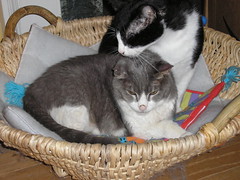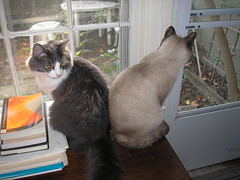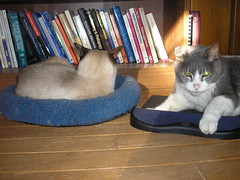Today began with some sad news: my sister's thirteen-year old Shih-tzu died this morning. He was suffering from not only kidney failure, but many other ailments of old age: deafness, blindness, arthritis. It was time.
But the passing of a companion animal is never an easy thing. Last December, as I've mentioned here before, I lost my 18-year-old cat, Kitty, to kidney failure. And I've spent the year since trying to regain a balance of animals in my house.
We met Casey at our local Petco last year on New Year's Day.

He came to live with us a few weeks later, after we gave it a lot of thought and were assured he was a sweet-tempered cat who wouldn't bother Clyde, our surviving 18-year-old. As you can see, Casey is pretty nice to Clyde. Clyde, however, is fairly indifferent. He doesn't even groom himself. But at least we appreciate Casey's help in that area, even if Clyde doesn't.

Even though Casey didn't bother Clyde, he was, at an estimated age of 5 or 6, a good bit livelier than Clyde, so thought he needed someone closer to his age to play with.
We looked and agonized and rejected very young cats before meeting Gabe at the Humane Society in March. Yeah, they said he was 3, but he's not. He's just getting around to being one or so. And so ensued the Gabe and Casey wars that gave us so much grief: Gabe had way more energy than Casey could deal with.

But, really, isn't Gabe one of the cutest cats you've ever seen? And very sweet. So, despite his aggression, we were pretty much in love from day one.
Get another cat, some told us. A cat closer to Gabe's age, one that he can play rough with and so stop bothering Casey.
Um. We tried that one, remember? We weren't so sure we should try it again.
But try we did. In August. And that has a sad ending, which I won't recount here.
Finally, we decided to try once more. We met Simon on October 1 in Lee's Summit, where the KC Siamese Rescue folks were showing some of their cats. He gave us nice head butts, and so we brought him home. He was also one year old or so, so we crossed our fingers that he and Gabe would get along.

And, friends, they do. Even Simon and Casey get along. We took a month to introduce them slowly, and it's paid off. Look at those guys. Yes, it's true that Gabe has a scrape above his eye that's probably from Simon, but all seems forgiven.

And who could have imagined this scene between Gabe and Casey just three or four months ago?

So it ends well, even as we mourn the passing of another companion animal. So it ends, the year in cats.
(This entry, by the way, is dedicated to Elizabeth, who recently requested more cat pictures.)










